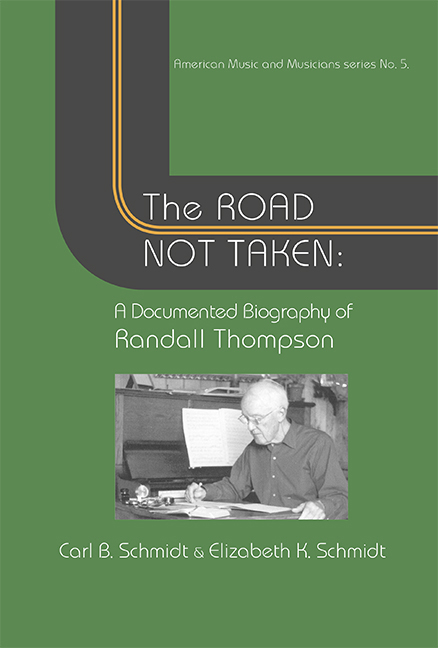Book contents
- Frontmatter
- Contents
- List of Illustrations
- List of Tables
- Library Sigla and Abbreviations
- Guide to Harvard University and Oberlin College Collections Referenced by Box Number
- Preface: Gateway to a Career
- Acknowledgments
- Chapter I Family History and Formative Years
- Chapter II Undergraduate Study at Harvard College (1916-20)
- Chapter III Lessons with Ernest Bloch and Graduate Study at Harvard University (1920-22)
- Chapter IV Damrosch Fellowship Years at the American Academy in Rome (1922-25)
- Chapter V Courtship and Marriage (1925-27)
- Chapter VI New York City—Wellesley College—A Guggenheim Fellowship (1927-31)
- Chapter VII Guest Conducting, Reception of Symphony no. 2, and College Music: An Investigation (1931-35)
- Chapter VIII Life after College Music: An Investigation (1935-37)
- Chapter IX The University of California at Berkeley (1937-39)
- Chapter X Curtis Institute of Music: The Hiring Process (Spring and Summer 1939)
- Chapter XI Curtis Institute (Fall 1939-Spring 1941)
- Chapter XII The University of Virginia (Fall 1941-Spring 1945)
- Chapter XIII Princeton University (Fall 1945-Spring 1948)
- Chapter XIV Return of a Favored Son: Harvard University (Fall 1948-Spring (1957)
- Chapter XV Harvard University (Summer 1957 to July 1, 1965)
- Chapter XVI The Early Retirement Years (1965-75)
- Chapter XVII The Final Years (1975-84)
- Chapter XVIII Recapitulation and Coda
- Bibliography of Works Cited by Abbreviations
- Index
Chapter VI - New York City—Wellesley College—A Guggenheim Fellowship (1927-31)
- Frontmatter
- Contents
- List of Illustrations
- List of Tables
- Library Sigla and Abbreviations
- Guide to Harvard University and Oberlin College Collections Referenced by Box Number
- Preface: Gateway to a Career
- Acknowledgments
- Chapter I Family History and Formative Years
- Chapter II Undergraduate Study at Harvard College (1916-20)
- Chapter III Lessons with Ernest Bloch and Graduate Study at Harvard University (1920-22)
- Chapter IV Damrosch Fellowship Years at the American Academy in Rome (1922-25)
- Chapter V Courtship and Marriage (1925-27)
- Chapter VI New York City—Wellesley College—A Guggenheim Fellowship (1927-31)
- Chapter VII Guest Conducting, Reception of Symphony no. 2, and College Music: An Investigation (1931-35)
- Chapter VIII Life after College Music: An Investigation (1935-37)
- Chapter IX The University of California at Berkeley (1937-39)
- Chapter X Curtis Institute of Music: The Hiring Process (Spring and Summer 1939)
- Chapter XI Curtis Institute (Fall 1939-Spring 1941)
- Chapter XII The University of Virginia (Fall 1941-Spring 1945)
- Chapter XIII Princeton University (Fall 1945-Spring 1948)
- Chapter XIV Return of a Favored Son: Harvard University (Fall 1948-Spring (1957)
- Chapter XV Harvard University (Summer 1957 to July 1, 1965)
- Chapter XVI The Early Retirement Years (1965-75)
- Chapter XVII The Final Years (1975-84)
- Chapter XVIII Recapitulation and Coda
- Bibliography of Works Cited by Abbreviations
- Index
Summary
Switzerland has proved to be ideal for my work.
(Randall Thompson)
MAKING A LIVING
WRITING REVIEWS
Lacking a permanent position Thompson cobbled together literary writing and composition to generate income. Several months before his marriage, he had started writing book reviews for the Saturday Review of Literature. Five were published between December 11, 1926 and November 5, 1927, all of which deal with musical subjects—three contain actual musical com¬positions, a fourth concerns Wagner's lovers, and the fifth muses about the future of music. In the course of these reviews published under the heading Ars Lyrica, Thompson reveals considerable erudition and an appropriately heady literary style of description skillfully designed to engage his audience. This is illustrated by the opening paragraph of his November 1927 review of Sigmund Spaeth's Read ‘em and Weep, The Songs You Forgot to Remember.
With a giant sabre as long as from 1755 to the death of Valentino, Mr. Spaeth has cleft open the large, heterogeneous mass of American popular songs. Admittedly he reveals only a cross-section, but along the walls of the rift that he has made one can trace quite clearly the multicolored procession of vocal efforts. And thanks to his master stroke we are not made to rehearse any but the best of the lot; and these are presented in a light-hearted, vigor¬ously intelligent way.
When he reviewed Robert A. Simon's Bronx Ballads—after his work on The Grand Street Follies of 1926 in which he had unfurled tunes by sev¬eral composers—Thompson's interest must have been piqued by Simon's clever parodies of Bizet's Carmen, Rachmaninov's Prélude in C-sharp minor, Wagner's Tannhäuser, and other works in the introductions to songs. Some¬times Simon even tantalized the pianist with phrases such as “Like something you’ve heard before”! He must have been equally amused by Spaeth's mastery of musical style and ability to parody music from widely divergent nationali¬ties in Words and Music: A Book of Burlesques in which, among other things, he sets “The Musical Adventures of Jack and Jill” as an oratorio version, a Schubert version, an Italian operatic version, a modern French version, and finally a jazz version! What remuneration he received is unknown, but these reviews helped get his name before a well-educated readership.
- Type
- Chapter
- Information
- The Road Not TakenA Documented Biography of Randall Thompson, 1899–1984, pp. 203 - 248Publisher: Boydell & BrewerPrint publication year: 2018

